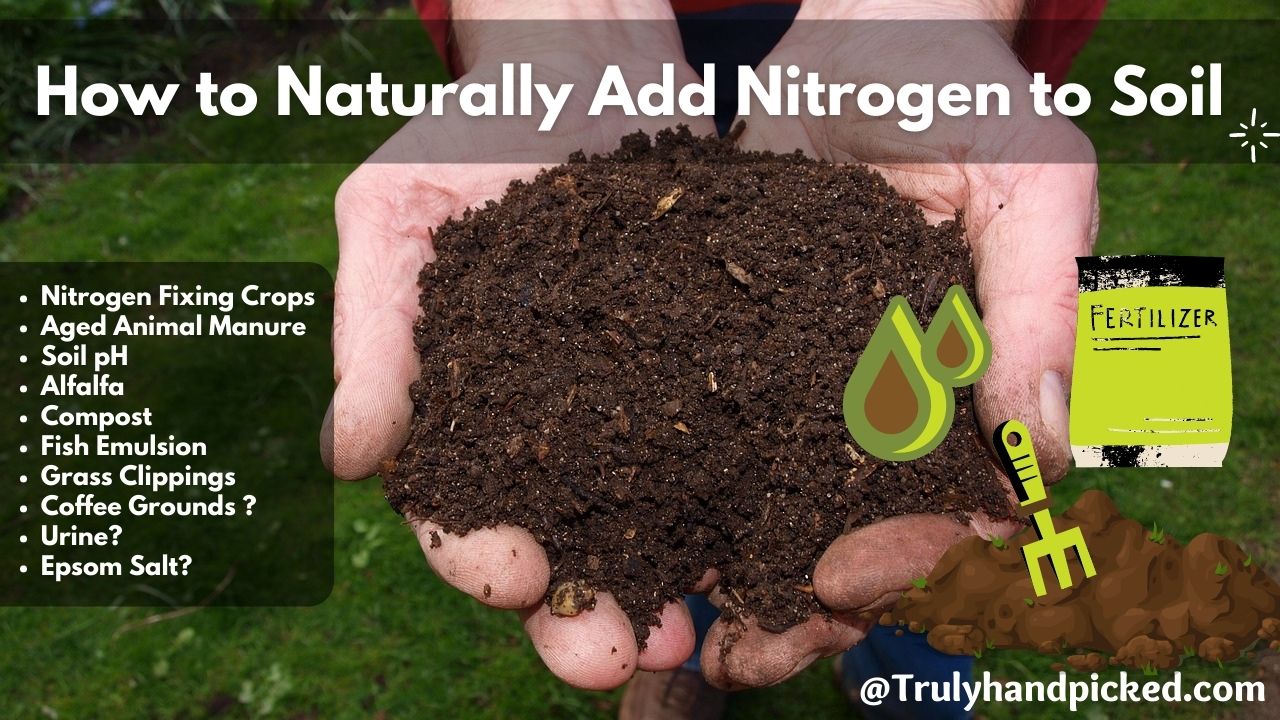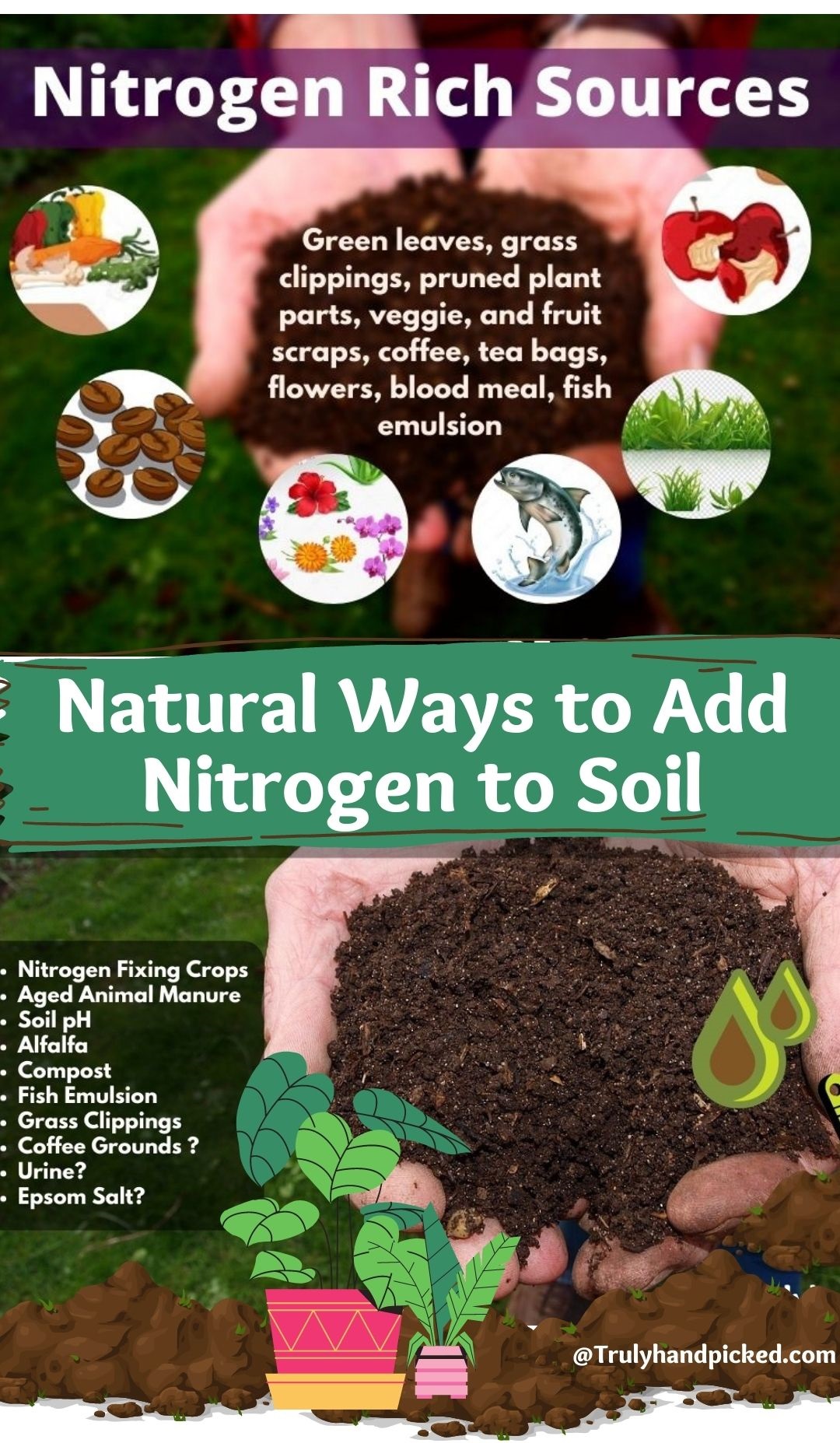Every gardener wants to keep their garden green and healthy, but if you have a garden that was doing well in the past and is slowly losing its charm? Chances are your plants are telling you about the nitrogen deficiency in your soil.
Nitrogen is the basic building block and most important nutrient for a healthy plant’s photosynthesis and growth. In the wild mother nature takes care of it, but in our garden responsibility falls on us.
Though “N” Nitrogen is available in high levels in synthetic NPK fertilizers and is easy to add in long run it spoils your soil. Here we are going to look into options to organically enrich your soil with the naturally available nitrogen.
Symptoms of Nitrogen Deficiency in Plants and Soil
Before getting into the list of ways to add nitrogen, let’s check the signs of low nitrogen levels.
- Your plant leaves turn old faster
- Pale to yellowish leaves (Chlorosis)
- Stunted and slow growth
- Relatively smaller flowers and fruits
- Legumes and clover growth indicate low nitrogen levels in your soil
Reasons for Nitrogen Deficiency
Nitrogen deficiency in soil may occur due to
- Heavy rain may wash away the nitrogen
- Frequent harvest of the same kind of plants
- Nitrogen-hungry ornamental plants eat up faster
- Less maintenance without replenishing after a harvest
- Less organic matter
Quick Overview – Short Web Story on Ways to Add Nitrogen to Soil
Why do plants need nitrogen?
Nitrogen is like a basic building block for plants, as it is one of the major components of chlorophyll. While you already know the rest of the story, without chlorophyll plants cant prepare their own food through photosynthesis.
How do plants get nitrogen?
The nitrogen available in the atmosphere is not directly accessible/available to plants. While decaying organic matter, animals, and fertilizers add nitrogen to the soil. With the help of bacteria, nitrogen is broken into ammonia and finally into nitrates. While this enriches the soil and is easily available for plants that are used to produce proteins, amino acids, and DNA.
Natural Ways to Add Nitrogen Back to Soil

1. Check for soil pH
When your soil pH is less than 6 or greater than 7.5 it greatly affects your plant’s nitrogen intake from the soil. In other words, too acidic or alkaline soil can affect your plant’s growth, so test your soil’s pH before adding nitrogen.
2. Add compost/ decomposed organic matter
Boost your soil nutrients with the use of compost at regular intervals to replenish the depleted nitrogen. Bacteria in organic wastes break them into ammonium and later turn into nitrates which are effortlessly absorbed by the plants.
Compost made mainly from leaves, fruit peels and veggies contain high levels of nitrogen which are slowly released into the soil in the long run.
3. Sprinkle alfalfa meal
Alfalfa is largely used by livestock farmers as a nutrient-rich feed, but it can directly or use the processed alfalfa as a meal in your garden to enrich your soil with nitrogen.
You can use a cup of this meal and sprinkle it around the plants or while preparing a bed. Rake or mildly till to blend it with the soil or leave the work to earthworms and microbes.
Alfalfa can also be added to compost to act as a compost activator and make it rich in nitrogen and other trace minerals. Note: this will break down faster and kickstarts little heat into the place and the pellet version may attract rodents.
4. Grow nitrogen-fixing cover crops
Cover crops are not just for large-scale farms or gardening, also few crops are mistaken as weeds. While cover crops like legumes, grass, and radishes make your soil fertile and rich for the next occupants.
Also, legume plants like peas, beans, and clovers take nitrogen up from the air and do nitrogen-fixing with the help of bacteria.
Let to die or cut and leave them on the ground before they mature which make the root nodules and plant decompose. That enriches your soil with natural nitrogen which is also vegan and non-synthetic.
Commonly used nitrogen-fixing cover crops: peas, beans, clover, cowpea, and hairy vetch.
5. Add mowed grass clippings
Adding grass clippings from your lawn or from nearby sources can make your soil rich in organic matter. Grass clippings also act as mulch and once it gets decomposed it is like a 4-1-2 fertilizer with 4% of naturally rich nitrogen.
Before adding it to your soil or compost pile it is better you leave them in an open place to get dry grass clippings.
6. Use aged poultry or livestock manure
You can add aged chicken, sheep, or cow manure to fertilize your soil with rich sources of nitrogen. Though fresh manure is abundant in nitrogen, it’s advised not to use them directly on your soil.
Not just for the sake of resisting diseases, fresh manure contains way too much nitrogen which results in nitrogen toxicity. High levels of nitrogen burn your plants also leches into water drain and affects aquatic life.
Add aged manure or composted manure (even better) that will nourish your soil with nitrogen and other micronutrients for a healthy garden.
If you are about to use aged manure, for your edible garden, make sure you add it 4-6 weeks before the plant kickstart or are transplanted. This way you can be sure your garden produce had no direct contact with animal manure.
7. Use fish emulsion as a nitrogen fertilizer:
The fish emulsion prepared from parts of fish can act as good fertilizer for your plants with a 4-1-1 NPK ratio. It can be used directly on your soil or as a foliar spray. Use one tablespoon of it in one gallon of water and this diluted form can be used once a month. Apart from primary nutrients is good for additional and micronutrients.

Quick Summary on Nitrogen Sources and FAQ
- Good sources of organic nitrogen for your soil: Compost, worm casting, aged manure, nitrogen-fixing cover crops are few wonderful resources for soil nourishment which makes helps your plants to make enough amino acids and protein.
- Why use compost over synthetic fertilizer? Regular fertilizers only add nitrogen nutrients to your soil at a rapid rate. While organic composts slowly release quality nitrogen and drench your garden microbes, and brings life back to the soil. Your soil is not just a growing medium or material for plants rather a life that supports a healthy ecosystem.
- Are coffee grounds good for soil nitrogen? Partially yes. Direct application of coffee grounds on your garden is recommended by a lot of gardeners. Experts suggest adding it to your compost pile and let the microbes or worms do the work before it’s available for plants.
- Nitrogen in coffee grounds can’t be easily absorbed, bacteria in the soil have to work on it for its bioavailability. Don’t use dry and unprocessed (fresh and not brewed) coffee grounds if you want directly add them to your soil.
- Do Epsom salt increase nitrogen in soil? No, it doesn’t contain NPK, and nor it adds nitrogen to the soil. While magnesium sulfate may help the slow release of nitrogen from fertilizer and help the plant to absorb. Unless your soil is magnesium deficient don’t think of it, as overuse of Epsom salt may result in magnesium toxicity.
- Dog and human urine for garden plants nitrogen needs: No, it’s not hygienic and easy to use. Aged urine is safe to use in your garden without worrying about antibiotic resistance. Again make sure you have the patience to store and use it later after several months (Ref science daily).
References: coffee grounds, making compost, manure fact sheet, nitrogen sources